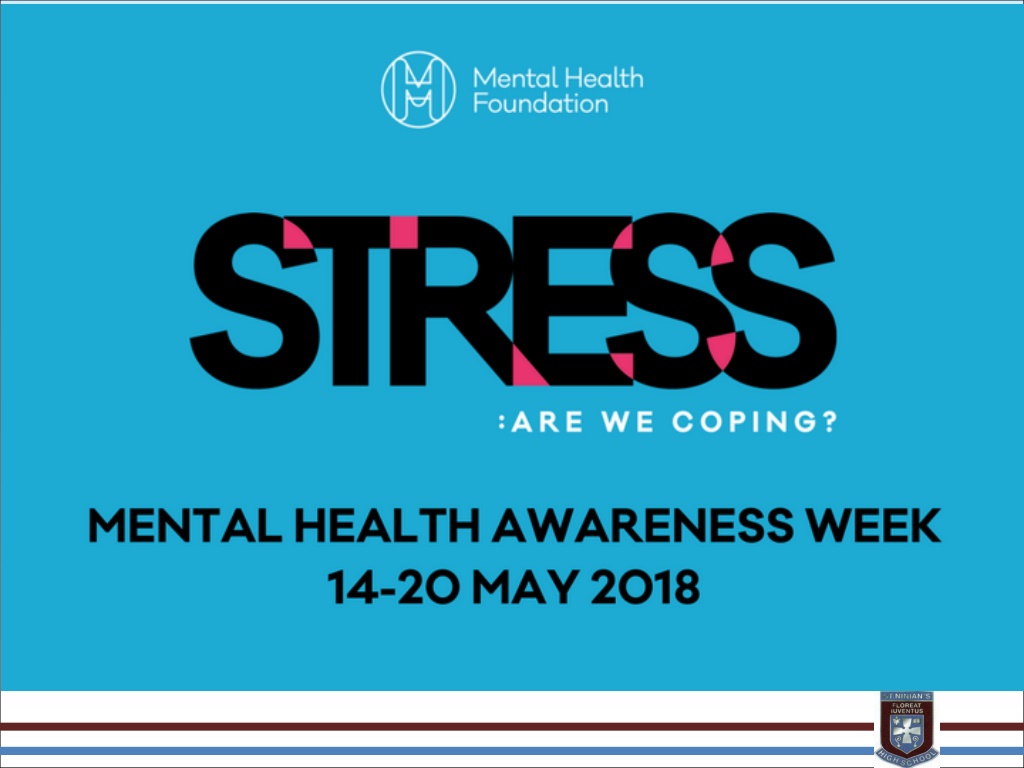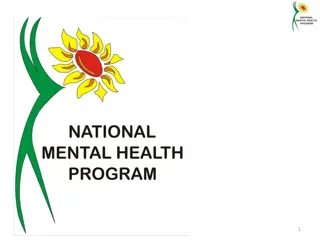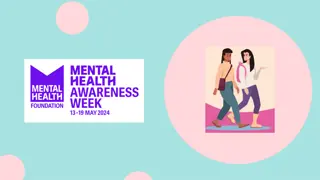
Celebrities Advocating Mental Health Awareness
Learn how celebrities like Ryan Reynolds and Demi Lovato are openly discussing their struggles with mental health, aiming to reduce stigma and encourage seeking help. Mental health awareness is crucial for personal well-being and seeking support when needed.
Download Presentation

Please find below an Image/Link to download the presentation.
The content on the website is provided AS IS for your information and personal use only. It may not be sold, licensed, or shared on other websites without obtaining consent from the author. If you encounter any issues during the download, it is possible that the publisher has removed the file from their server.
You are allowed to download the files provided on this website for personal or commercial use, subject to the condition that they are used lawfully. All files are the property of their respective owners.
The content on the website is provided AS IS for your information and personal use only. It may not be sold, licensed, or shared on other websites without obtaining consent from the author.
E N D
Presentation Transcript
Mental Health Awareness Week 14th 20th May 2018
I understand the importance of mental wellbeing and this can be fostered and strengthened through personal coping skills and positive relationships. I know that it is not always possible to enjoy good mental health and that if this happens there is support available. HWB 0-06a / HWB 1-06a / HWB 2-06a / HWB 3-06a / HWB 4- 06a I know that we all experience a variety of thoughts and emotions that affect how we feel and behave and I am learning ways of managing them. HWB 0-02a / HWB 1-02a / HWB 2-02a / HWB 3-02a / HWB 4- 02a
Mental illness is one of the major health challenges in Scotland. It is estimated that more than one in three people are affected by a mental health problem each year. The most common illnesses are depression and anxiety. 1 in 3 GP appointments relates to a mental health problem.
Numbers rising The number of people being treated for mental health issues is rising and the number of people dealing with it has increased by 10 per cent in the last 10 years. The worst thing about it is that it doesn't discriminate- anyone can be affected by it. The following Celebrities have all suffered from mental health issues at some point in their lives
Ryan Reynolds Ryan Reynolds opened up about the anxiety he experienced whilst filming Deadpool. "I never, ever slept. Or I was sleeping at a perfect right angle just sitting straight, constantly working at the same time", he explained. "By the time we were in post [production], we d been to Comic-Con, and people went crazy for it. The expectations were eating me alive." The 40- year-old credited his wife, Blake Lively, for helping him through it: "Blake helped me through that. I m lucky to have her around just to keep me sane".
Demi Lovato The singer has never shied away from opening up about her problems and is determined to de-stigmatise mental illness by sharing her story. Demi Lovato said: I just think mental illness is something people need to learn more about. I want people to know it's okay to ask for help and it's okay to have a mental illness." Speaking at the National Council for Behavioural Health in Washington DC, she said: I think it's important that people no longer look at mental illness as something taboo to talk about. It's something that's extremely common, one in five adults has a mental illness, so basically everyone is essentially connected to this problem and this epidemic," she explains. "The problem with mental illness is people don't look at it as a physical illness. When you think about it, the brain is actually the most complex organ in your body. We need to treat it like a physical illness and take it seriously."
Cara Delevingne She is one of the most successful models in the world but Cara Delevingne used her power for good when she posted on Twitter about her battle with depression. She Tweeted: "I suffer from depression and was a model during a particularly rough patch of self hatred. I am so lucky for the work I get to do but I used to work to try and escape and just ended up completely exhausting myself. I am focusing on filming and trying to learn not to pick apart my every flaw. I am really good at that. Justin Bieber Justin Bieber spoke to NME about how fame had a negative effect on his mental health: I m struggling just to get through the days. I think a lot of people are. This life can rip you apart. [I get depressed] all the time. And I feel isolated. You re in your hotel room and there are fans all around, paparazzi following you everywhere, and it gets intense. When you can t go anywhere or do anything alone you get depressed. I would not wish this upon anyone.
What are the aspects of Mental Health: Fear Anxiety Self-Harm Stress Feeling overwhelmed
There is now more awareness of Mental Health than ever before. However, this does not make it any easier to talk about when you are suffering from Mental ill health. Mental Ill Health can affect: Your friends Your family Yourself What s really scary is that your best friend could be suffering from Mental Illness and you may never know
There are a few things that we can do to help all of these people: 1. Talking about your feelings This isn t a sign of weakness. It s part of taking charge of your wellbeing and doing what you can to stay healthy If you open up, it might encourage others to do the same If it feels awkward at first, give it time. Make talking about your feelings something that you do
2. Keeping Active The importance of physical activity cannot be underestimated During and after exercise your brain releases chemicals into the body that makes you feel good Exercising doesn t just mean doing sport or going to the gym. Walks in the park, gardening or housework can also keep you active You should look to do about 30 minutes exercise at least five days a week
3. Eat well Your brain needs a mix of nutrients to stay healthy and function well, just like the other organs in your body A diet that s good for your physical health is also good f or your mental health A healthy balanced diet includes: - Lots of different types of fruit and vegetables - wholegrain cereals or bread - nuts and seeds - dairy products - oily fish - plenty of water
4. Keep in touch Strong family ties and supportive friends can help you deal with the stresses of life. Friends and family can make you feel included and cared for. They can offer different views from whatever s going on inside your own head. They can help keep you active, keep you grounded and help you solve practical problems. There s nothing better than catching up with someone face- to-face. But that s not always possible. Give them a call, drop them a note or chat to them online instead. Keep the lines of communication open. It s good for you!
5. Ask for help None of us are superhuman. We all sometimes get tired or overwhelmed by how we feel or when things go wrong. If things are getting too much for you and you feel you can t cope, ask for help! People you can ask for help: - Parents/Family - Pastoral Teacher - Teacher you have a good relationship with - Friends - The GP (Doctor)
Mental Health Quiz You will be tested on your knowledge of mental health and mental health problems. This quiz will help you to challenge the misconceptions of Mental Health problems that affect young people If you fail to get through this quiz, you can complete it in your next PSHE Lesson. Get your pen and paper ready!!!!
Statement 1 True or False: Mental health problems make young people unpredictable and dangerous False: You may not even know a young person has a mental health problem. Mental health problems refer to a group of illnesses that can change how a young person may behave and feel with everyday life. Mental health problems manifest differently in different people. There are many mental health problems including depression, anxiety, eating disorders, bipolar disorder, and schizophrenia.
Statement 2 True or False: All mental health problems are caused by genetics. False: There are many reasons why mental health problems occur. They could be due to social, emotional, environmental or physical factors. Social and environmental factors: what is happening in our immediate world, where we live, whom we socialise with in and outside of school, and how we feel and react to things that affect us such as schoolwork and, peer pressure. Emotional factors : Psychologically we are all different. We all respond differently to life events such as bereavement, pressure at school or at home. Physical factors: Physically we are all different too. We may inherit through our genes certain physical ailments that might affect our mental health. We might also be more susceptible to some mental health problems because of genetics. There is no one cause of mental health problems.
Statement 3 True or False: Young people who experience mental health problems are different from other young people. False: Young people of all ages and backgrounds can experience a mental health problem. Statement 4 True or False: 1 in 100 young people will experience a mental health problem. False: 1 in 10 young people will experience a mental health problem. That might be 3 people in your classroom.
Statement 5 True or False: Depression, anxiety, self-harm and eating disorders are the most common mental health problems experienced by young people. True: These are the four most common mental health problems experienced by young people. Depression: It can affect young people in different ways. It can include a lack of interest and enjoyment, consistent sleep problems, changes in eating habits that can affect weight loss or gain, and avoiding friends or peers. Anxiety: Feeling anxious sometimes is a normal reaction to challenging changes in our lives. But for some young people anxiety is a constant feeling. This can lead to a lack of concentration, difficulty in making decisions and finding it difficult to control tempers and emotions. Eating disorders: Some young people may use food as a way of controlling their feelings and coping with pressures. Anorexia Nervosa and Bulimia Nervosa are two such examples of eating disorders.
Statement 6 True or False: Talking about mental health problems will make things worse. False: Everyone, including young people, should be encouraged, and be able to talk about their mental health problems. But some young people fear being looked upon negatively and treated differently. This is called stigma and discrimination. It can lead to young people having feelings of shame or disgrace. It can also lead to young people not taking up opportunities for fear of being bullied, which might make their mental health problems worse. Statement 7 True or False: Mental health problems will clear themselves up on their own. False: A young person should seek help and advice. Speaking to a trusted person or a professional can help a young person start to overcome their difficulties. In doing this they will start their process of recovery from mental health problems.
Statement 8 True or False: Having a mental health problem is equivalent to having a broken leg. True: We all have mental health just like everybody has physical health. Mental health relates to our emotional, social and physical wellbeing. If we are mentally healthy we are able to engage with everyday living that includes enjoying, achieving, problem solving and actively participating in everyday events and also communicating and socialising with peers, friends and teachers. Now pass your paper/booklet to a classmate so that they can mark your answers.






















